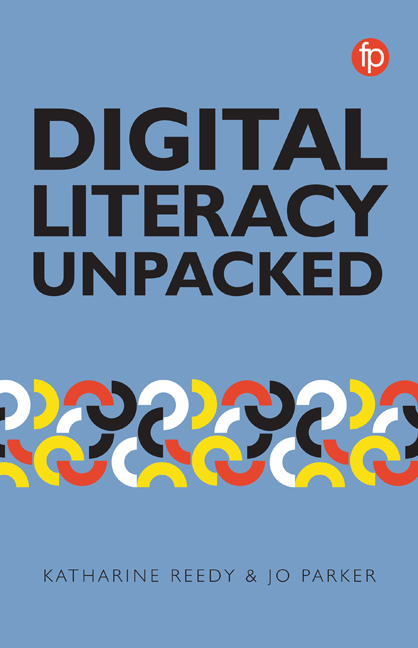Book contents
- Frontmatter
- Contents
- List of figures and case studies
- Foreword
- Notes on Contributors
- Introduction
- Part I Approaching Digital Literacy
- 1 The Trouble With Terminology: Rehabilitating and Rethinking ‘Digital Literacy’
- 2 Unpacking Digital Literacy: the Potential Contribution of Central Services to Enabling the Development of Staff and Student Digital Literacies
- 3 Collaboration and Coaching: Powerful Strategies for Developing Digital Capabilities
- Part II Learning in a Digital World
- Part III Developing Staff Digital Literacies
- Part IV Digital Citizens and Workers
- Conclusion
- Index
2 - Unpacking Digital Literacy: the Potential Contribution of Central Services to Enabling the Development of Staff and Student Digital Literacies
from Part I - Approaching Digital Literacy
Published online by Cambridge University Press: 24 September 2019
- Frontmatter
- Contents
- List of figures and case studies
- Foreword
- Notes on Contributors
- Introduction
- Part I Approaching Digital Literacy
- 1 The Trouble With Terminology: Rehabilitating and Rethinking ‘Digital Literacy’
- 2 Unpacking Digital Literacy: the Potential Contribution of Central Services to Enabling the Development of Staff and Student Digital Literacies
- 3 Collaboration and Coaching: Powerful Strategies for Developing Digital Capabilities
- Part II Learning in a Digital World
- Part III Developing Staff Digital Literacies
- Part IV Digital Citizens and Workers
- Conclusion
- Index
Summary
Introduction
Centralised professional services in colleges and universities are uniquely positioned to promote institution-wide development of digital literacies. Front-facing service staff (those who regularly communicate and come into contact with academic staff and students) represent the human interface between available services and the learning, teaching and research practices of students and academics. They can play a pivotal role in raising awareness, informing and helping people to recognise the utility of digital tools and other complementary services (external and internal to the institution). In this regard, digital literacies constitute the knowledge and skills required to be able to use these tools and services effectively to perform useful digital practices. Acting as mediators, service staff are able to promote connections between people who are known to have relevant experience and knowledge, fostering networking and creating the conditions for conversations to take place (Ford, 1999). Through harvesting, managing and disseminating information gathered, service staff can perform a curatorial role, building a knowledge hub to make available what has been identified as useful. The aim is to enable educators and students to make informed decisions about how best to invest their time and effort to recognise and adopt useful digital practices. The challenge for the institution is doing this in a way that scales and is sustainable. Although one-off projects and isolated initiatives have demonstrated that the approaches described here have value in promoting the development of staff and student digital literacies, more needs to be done to ensure there is enduring change.
This chapter presents an interpretation of digital literacies and explores the implications for promoting institution-wide development. The ways in which service staff can enable students and academic staff to make appropriate and effective use of digital technologies are described with reference to examples and key recommendations.
Learning literacies
Digital literacies should be understood as part of a spectrum of related knowledge and skills. The Beetham and Sharpe Learning Literacies Development Framework (Beetham, McGill and LittleJohn, 2009) iden - tifies what should be considered when designing opportunities to promote the development of academic, information, digital, media, social and other literacies. A subsequent modification of the Framework (see Figure 2.1) recognises ‘awareness’ as an additional contributing factor (Jisc, 2014) and this has provided a useful structure and guide to help clarify the role of service staff and their contribution to the process of developing digital literacies.
- Type
- Chapter
- Information
- Digital Literacy Unpacked , pp. 17 - 28Publisher: FacetPrint publication year: 2018



